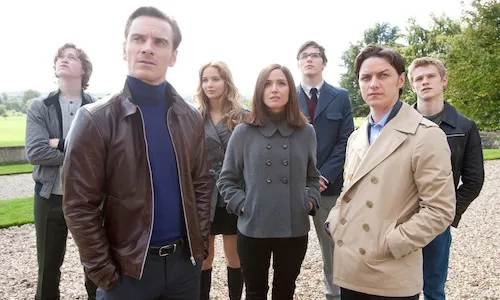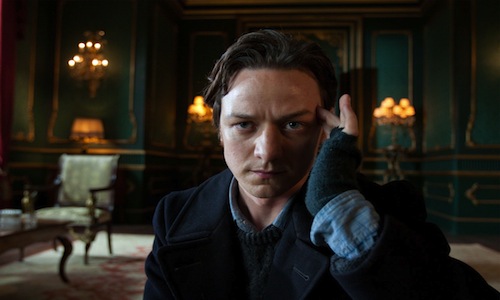As I have to insist, I thoroughly enjoyed X-Men: First Class, but there’s no harm in a difference of opinion. OH yes, sorry, I’ll get off the lawn. Sorry. I know you don’t like kids on your lawn.
Some time ago, I was watching America’s Next Top Model (bear with me), probably in the middle of Cycle 1433, when I realized that the conventions of the show would repeat themselves, in exactly the same procession, with the exact same result, ad infinitum. Even the labeling of each season as a “cycle” demonstrates the manner in which Tyra Banks et al see their hapless young contestants. This is to say, convention is not often a good thing. It makes writers lazy, it makes viewers lazy, and it makes our whole world a reflecting mirror unto itself.
What X-Men: First Class has done is pay lip service to the conventions of the lore that predates it without a real understanding or feel for material (with one important exception) to create a new widget that has little to do with the X-Men at all. In fact, replace these characters with any Stock Superheroes and you’d have largely the same movie.
Umberto Eco once said that comic book continuities take place “where what has happened before and what has happened after appear extremely hazy. The narrator picks up the strand of the event again and again.”
In this, First Class gets the haziness spot on. But the strand of the event is anyone’s guess. If it is meant to be part of the continuity of X1–X3, it makes enough missteps to make that consideration absurd. For one thing, why does Xavier go out of his way to mention how Erik was once an old friend in X1, but fail to mention Mystique, who in this film is his very oldest friend? Why is Havok in this ’60s era movie a young man of about 20, but Cyclops (his older brother) merely 30ish circa 2000, 40 years later? Why do we see a human Hank McCoy on television in X2, if he’s already blue in First Class? Why does Xavier seem so surprised by Magneto’s telepathy-blocking helmet in X1 when he’s run up against it in this prequel?
Not that the X-Men series seems to have someone in charge of the overall continuity. (We will not be speaking of the general disaster that was Wolverine: Origins.) (Never existed.) (Nope.)
Let’s say it’s a reboot, then, despite the winking Easter egg of Rebecca Romijn briefly appearing as the “older” version of Mystique. And, despite the film beginning with almost a shot-for-shot remake of the X1 opening sequence, with young Erik in Auschwitz, being pulled away from his parents. Instead of keeping the quiet horror of the boy never seeing his parents again, having to assume the worst, we get the next scene of a smarmy Kevin Bacon using his mother as emotional bait to compel Erik to use his powers. Matthew Vaughn, the director, also sees fit to show us a grieving and angry young Erik waving his arms around like a flop doll, severely diminishing whatever gravity the already hamfisted scene had left. It’s here that the film shows us its deep misunderstanding of the X-Men series, which has always felt it better to leave its atrocities to the imagination. (Say what you will about X3, but the cut away from Phoenix’s explosion against Cyclops was extremely in line.)
From there, it’s one misstep after another. I’m disinclined to enjoy any alternate presentation of a comic world where said presentation delights in simply making the characters different than what you’d expect. Without a thought to the personalities and backgrounds of the mutants involved, the writers have shaped new entities outside the necessity of them being the X-Men. Professor Xavier is a bibulous party boy. Mystique is a vain wilting flower. (Can I take a parenthetical to decry the consistent diminishment of female supers from comic to film, by the way? Mystique, Emma, Rogue in X1–X3 — they’ve all been “niced up” for their film debuts.) Beast is an arrogant asshole — who can, suddenly and without reason, run faster than the Flash. Simply going against earlier incarnations and histories isn’t advanced; it’s the hollow gimmick of a self-satisified high school senior. Thus, the end result is muddled. For example, who in the writers’ room missed that Emma Frost’s diamond form can’t be broken by anything other than diamond?
(As a full disclosure, one of the writers of First Class called me a “cultural Stalinist,” but I wear the badge with honor, sir.)
Before I go further, I want to stand up and applaud the construction of the Magneto character and storyline in First Class. It’s 100% right, and it’s not just the magnificent and shining casting of Michael Fassbander that makes it so, either. As Time‘s Richard Corliss says, Fassbender absolutely dwarfs everyone else in the script, and his scenes are the only consistently interesting ones in the film. I’m not quite sure why much of the reception lauds James McAvoy and Fassbender together; I found McAvoy thoroughly limp as Xavier. It seemed the only things he did during the film were 1) smirk 2) well up with tears and 3) hold his fingers to his forehead.
I entirely cannot abide the portrayal of Xavier as smarmy — to me it defeats the entire purpose and personality of the man. In addition, this Professor Xavier, for all his whining that Magneto should not kill the Nazi who killed his mother, is an entirely unethical force. A man who normally questions to himself the repercussions of his smallest decisions, First Class‘s Xavier dictates to his best friend what she should do in bars and how she should look, constantly invades the minds of not only enemies, but allies, freezes time without a thought to the possible consequences, and erases the mind of Moira MacTaggert without her consent — essentially pulling a Willow Rosenberg on Tara, wiping a human being’s living memory for an indistinct and highly suspect cause.
For every scene in the film that gets the feel of the X-Men right (the initial meeting with the CIA, Magneto’s discovery of Nazis in Argentina, the training sequence), there are three more that I found devoid of passion and careless with lore.
Convention in comic books has its place. In the X-Men series (and most), it serves to ground the reader/viewer in a familiar setting with markers indicating we’re among friends. In the X-Men series, a short list: the SR-71 Blackbird, the metal helmet, the X-Mansion, Emma Frost’s boobs. But there is an artistry to covering these bases, a deeper meaning than just a few hat tips. In First Class, these bases are covered, but as a hurried gesture, in order to get to the next painfully stolid January Jones dialogue.
Natasha Simons is a freelance writer living in Brooklyn, if you can imagine such a thing. She blogs here.









Published: Jun 12, 2011 12:55 pm